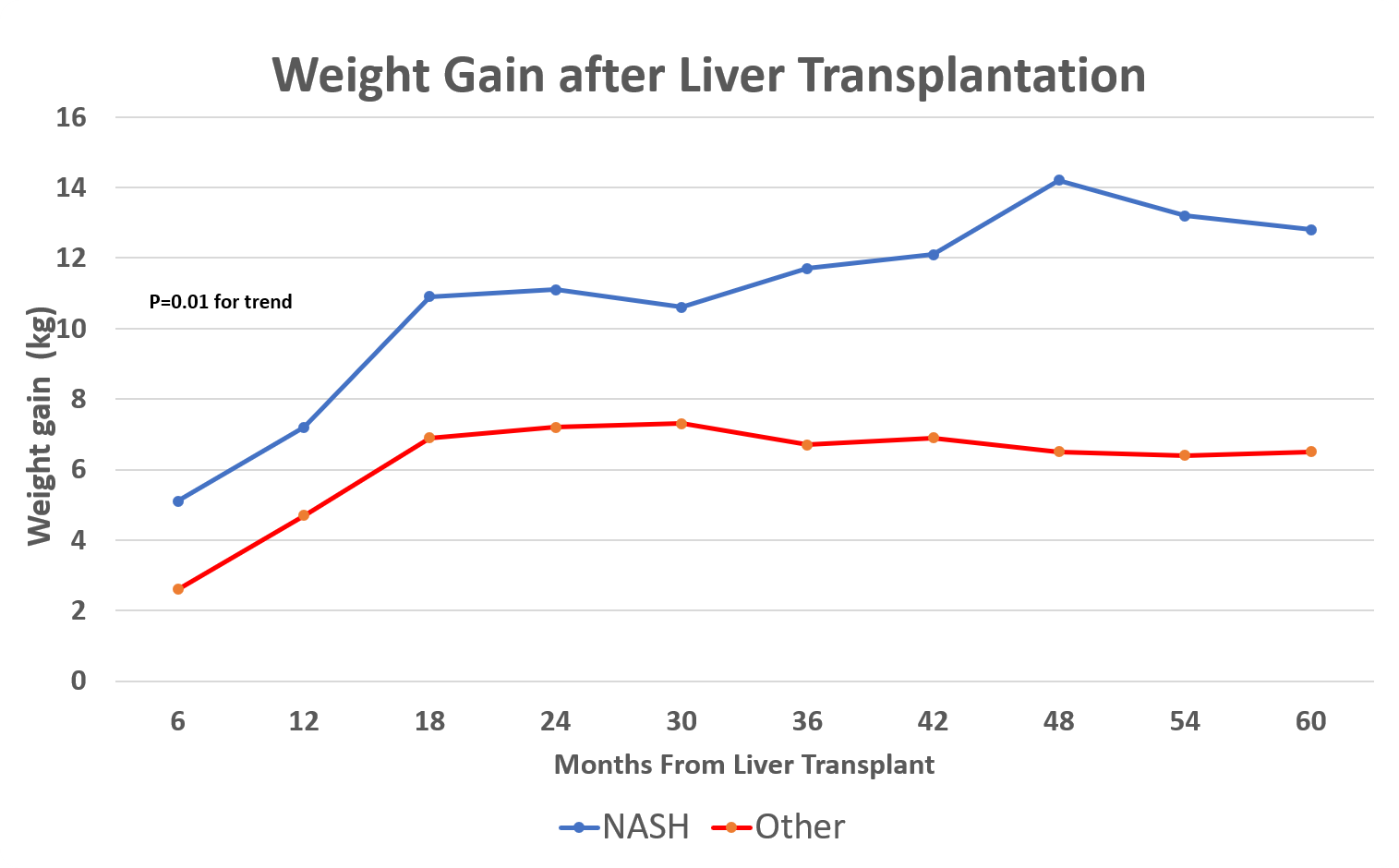Etiology of Liver Disease Affects Weight Gain after Liver Transplant
1Internal Medicine, Virginia Commonwealth University, Richmond, VA, 2Gastroenterology & Hepatology, Virginia Commonwealth University, Richmond, VA, 3Virginia Commonwealth University, Richmond, VA, 4Transplant Surgery, Virginia Commonwealth University, Richmond, VA
Meeting: 2019 American Transplant Congress
Abstract number: B313
Session Information
Session Name: Poster Session B: Liver Retransplantation and Other Complications
Session Type: Poster Session
Date: Sunday, June 2, 2019
Session Time: 6:00pm-7:00pm
 Presentation Time: 6:00pm-7:00pm
Presentation Time: 6:00pm-7:00pm
Location: Hall C & D
*Purpose: Weight gain after liver transplant (LT) is a key driver of cardiometabolic disease and associated mortality. There is little known about trends in post-LT weight gain including liver disease specific differences in weight gain after LT. The published data is limited by epidemiological studies linked to the SRTR database and with relatively short follow up. Patient level data are needed to better understand weight gain after transplant to optimize management. Thus, the aim of the current study was to evaluate long-term weight trends after LT.
*Methods: All patients who had a LT between 2010-2016 were evaluated. To minimize the confounding effects of perioperative fluid weight, the baseline weight was the 1st weight after hospital discharge for LT. Body weights were collected at 6-month intervals from LT to end of follow up to 1/2018. Patients with combined organ transplants and those who died within 1 year after LT were excluded. To keep the analysis focused, we evaluated patients transplanted for either NASH, alcohol or HCV related cirrhosis since these are the most common indications for LT.
*Results: A total of 496 patients had a LT over the study period and met study criteria. The baseline distribution of etiology of liver disease was: HCV (N=227), NASH (N=78), and alcohol (N=79). At the time of LT, the mean weight for patients transplanted for HCV, NASH, and alcoholic cirrhosis was 81±18 kg, 84±15kg and 75±17kg, respectively (P=0.004). The weight gain experienced by patients transplanted for NASH cirrhosis was higher than other etiologies of chronic liver disease (Figure 1). Patients with NASH started to gain weigh early after LT where they gained 7.3±13kg compared to 6.3±9.8kg for HCV and 3.5±12.1kg for alcohol (P=0.05). This trend persisted for up to 60 months where patients gained the greatest degree of weight (P=0.029). This trend persisted, and the difference was more pronounced at 60 months after LT (12.8±13.1kg for NASH vs. 6.5±13.3kg for other indications, p =0.01). In patients with NASH, male gender was predictive of weight gain but this association was no longer significant after 24 months. In patients transplanted for NASH cirrhosis, age, diabetes, hypertension, and dyslipidemia at the time of LT were not predictive of future weight gain.
*Conclusions: Weight gain after transplant is common in LT recipients regardless of etiology of liver disease. However, there is a liver disease specific impact on weight gain after LT in which patients transplanted for NASH cirrhosis are likely to gain the most weight after LT.
To cite this abstract in AMA style:
Chandrakumaran A, Siddiqui MB, Patel S, Lin F, Laurenzano J, Clinton J, Reichman T, Bhati C, Siddiqui MS. Etiology of Liver Disease Affects Weight Gain after Liver Transplant [abstract]. Am J Transplant. 2019; 19 (suppl 3). https://atcmeetingabstracts.com/abstract/etiology-of-liver-disease-affects-weight-gain-after-liver-transplant/. Accessed February 23, 2026.« Back to 2019 American Transplant Congress

